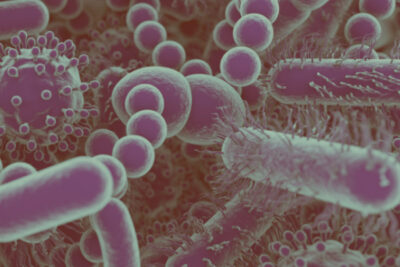
Gut Microbiome and Metabolism: The Connection
The gut microbiome, a complex ecology of bacteria that is impacted by diet and lifestyle, is critical for turning food into energy. Over the last two decades, scientists have worked to understand the relationship between the gut microbiota and metabolism.
Recent research has identified microbial signatures that may enhance illness progression, although the majority of study has concentrated on establishing connections between the gut microbiota and human disease states and examining causation and probable processes using cells and animals. The gut microbiota works with mammalian enzymes in the liver and gut mucosa to shape the biochemical composition of the food and effect host health and illness.
The Interaction of the Gut Microbiome and Body Metabolism
- An imbalance between good and bad bacteria in the gut (dysbiosis) can increase the risk of acquiring chronic diseases. The gut microbiota is critical to human health, especially in metabolic dysfunction disorders such as insulin resistance, obesity, cardiovascular disease, and type 2 diabetes.
- An increase in bad bacteria and/or a decrease in good bacteria can alter the functioning of the intestinal barrier and the gut-associated lymphoid tissues (GALT) by allowing structural components of bacteria, such as lipopolysaccharides (LPS), to pass through, activating inflammatory pathways that may contribute to the development of insulin resistance.
- The gut microbiome plays a crucial role in various processes such as dietary fiber degradation, fermentation, protein and peptide degradation, cholesterol reduction, nervous system development, appetite regulation, and intestinal and immune system development.
- Recent research indicates that gut microbiota, which plays a crucial role in regulating diet and host metabolism, can contribute to inflammation and potentially advance cardiometabolic diseases by producing microbially produced metabolites and molecules.
- Metabolites produced by the gut include short-chain fatty acids (SCFAs), alcohols, amino acids, glycerol and choline derivatives, and tertiary cycling of carbon dioxide and hydrogen. These metabolites affect with the immunological, metabolic, and nervous systems of the host to impact body physiology.
- Enteroendocrine cells of the gut mucosa release hormones such as peptide YY (PYY), cholecystokinin (CCK), gastric inhibitory polypeptide (GIP), serotonin (5-HT), and glucagon-like peptide 1 (GLP-1), which regulate essential metabolic processes such as insulin sensitivity, glucose tolerance, fat storage, and hunger. Metabolites of tryptophan impact immune cell activity.
- Gut microbes affect metabolic functions, inflammation, and hunger. They can synthesise vitamins such as vitamin K and B group vitamins, and prevent gastrointestinal disorders and conditions such as inflammatory bowel disease, irritable bowel syndrome, colon cancer, and antibiotic-associated diarrhea.
- The gut microbiota modulates homeostasis at the gut level by playing a dynamic role in many biochemical pathways of a cell. Changing their composition can result in the beginning or progression of diseases such as immunological, inflammatory, metabolic problems, and cancer. Understanding the relationships between gut microbes and nutrients can aid in developing tailored medicines and nutrition.
Gut Microbes and Absorption of Nutrients
- Gut microorganisms are essential for the digestion of complex carbohydrates and fiber, and the production of SCFAs, which contribute to overall metabolic health. These bacteria are involved in the breakdown of carbohydrates, proteins, plant polyphenols, bile acids, and vitamins.
- Butyrate, an SCFA, is the primary energy source for human colonocytes and has potential anti-cancer effect by inducing apoptosis in colon cancer cells and regulating gene expression by blocking histone deacetylases, is one of the most essential SCFAs for human health.
- Clostridium, Bacteroides, Eggerthella lentam and Eubacterium limosum metabolites have various functions in preventing and treating diseases such as diabetes, cancer, neuroinflammation, and aging.
- Candida, Campylobacter, Ruminococcus gnavus and Shigella influence trimethylamine N-oxides (TMAO) levels, which alter intestinal cholesterol clearance and may be an atherosclerosis mediator. Obesity, insulin resistance, and gastrointestinal malignancies may be associated with TMAO.
- Host-microbiome interactions contribute to the caloric balance affecting calorie intake as well as energy expenditure.
- Microbial imbalance in the gut can increase food intake by altering the synthesis of gastrointestinal peptides associated to satiety. Increases in the Firmicutes phlyum, the Clostridium genus, and the species Akkermansia muciniphila, Clostridium coccoides, Eubacterium rectale, Lactobacillus reuteri, Staphylococcus aureus, and Clostridium histolyticum have been linked to obesity-related dysbiosis.
- Gut bacteria can influence human lipid metabolism via a variety of direct and indirect biological pathways. A range of signaling chemicals generated by gut bacteria have powerful impacts on hepatic lipid and bile metabolism, as well as energy expenditure, cholesterol transport, and insulin sensitivity in peripheral tissues.
- Surprisingly, the intestinal microbiome affects physical as well as mental health. The delicate interplay between the gut and the brain, referred to as the gut-brain axis, has implications for stress response, metabolic health, and mood disorders.
Cultivating a Balanced Microbiome: Practical Strategies for Metabolic Health
- The gut microbiota is important for metabolism and can be enhanced by dietary and lifestyle modifications.
- The Western diet, low in fiber and heavy in chemicals, can diminish or eliminate specific microorganisms from the gut, causing immunological and metabolic dysfunction.
- Consuming fiber-rich foods like legumes, beans, fruits, vegetables, whole grains, seeds, and nuts, as well as polyphenol-rich foods like berries and green tea, will help you maintain a microbiome-friendly diet.
- Prebiotic supplements, which include certain kinds of fiber, can help helpful bacteria flourish.
- Inulin, naturally present in Jerusalem artichokes and chicory root, is a fiber source that promotes the growth of beneficial microorganisms.
- Probiotics, such as Bifidobacteria and Lactobacilli, can replenish lost microorganisms. Probiotics promote intestinal homeostasis, barrier function, host immunity, and gut microbiome and metabolome modulation, thereby enhancing overall health.
Final thoughts
The effects of gut microbiota on host metabolism, both during early development and later in life, may regulate risk processes and predispose to the development of cardiometabolic illnesses. Personalized medicine and focused therapies have the potential to enhance metabolic health and overall vigor.